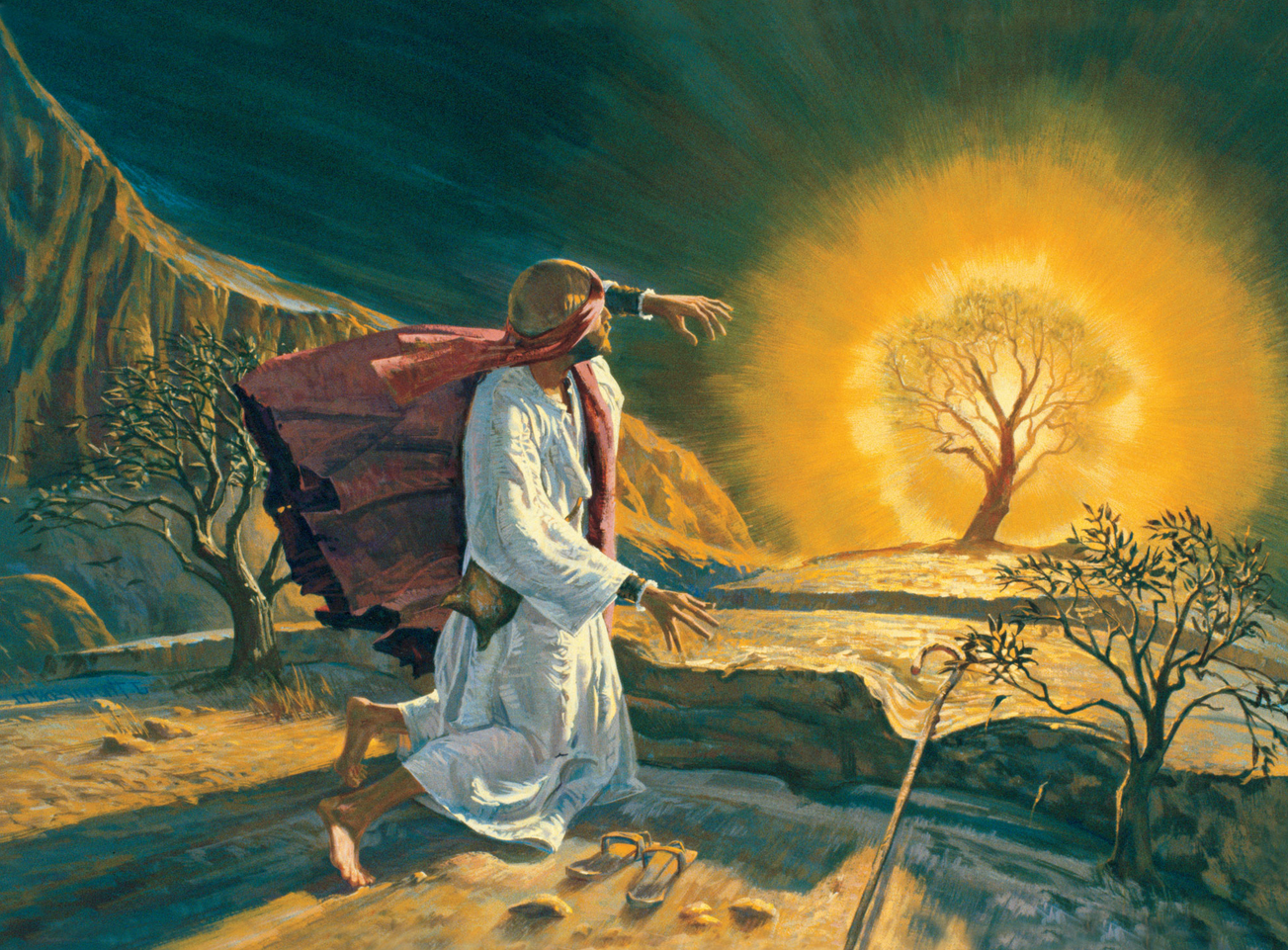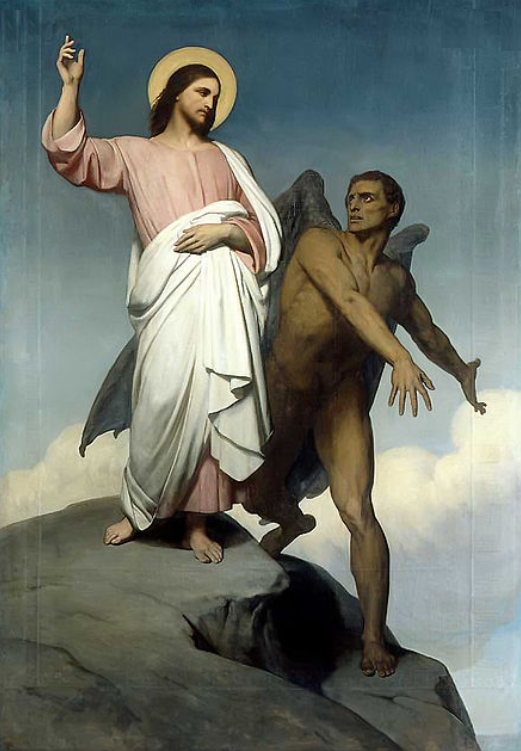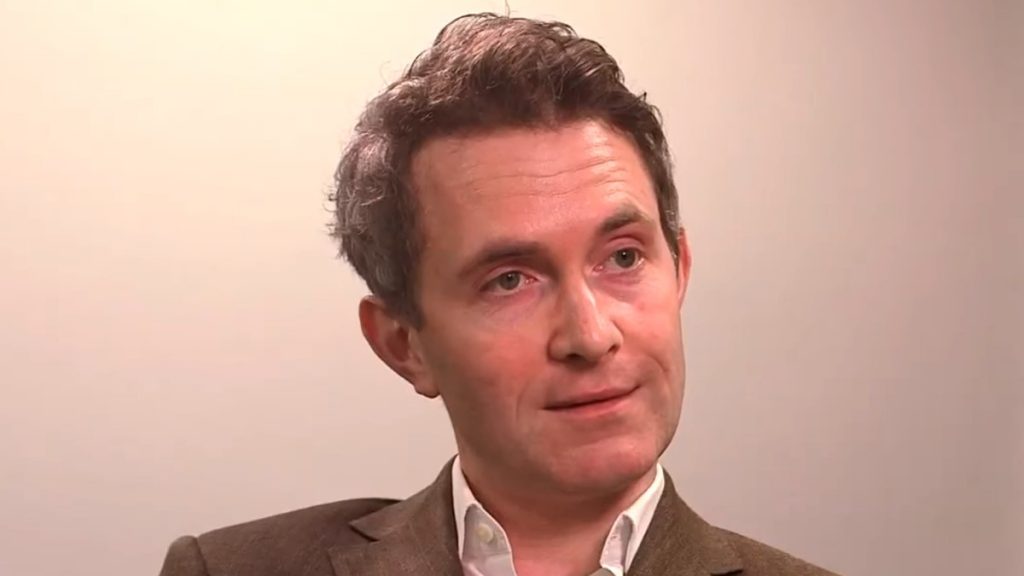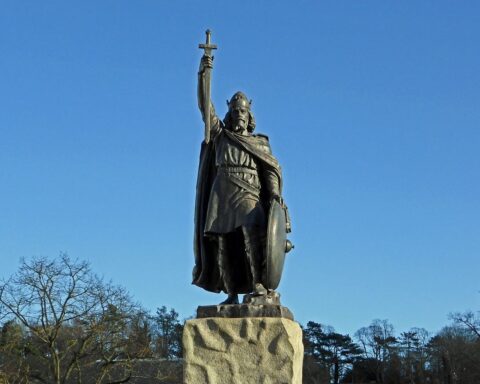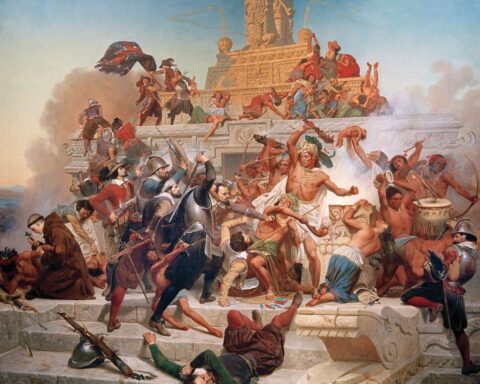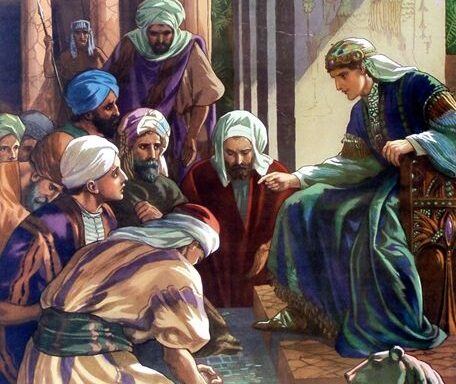Editor’s note: The following is extracted from Sermons, by Rev. William G. Neville (published 1908).
“And Moses said unto God, Who am I, that I should go unto Pharaoh and that I should bring forth the children of Israel out of Egypt?” — Ex. iii. 11.
God’s ways are not man’s ways; nor are God’s thoughts man’s thoughts. God’s ways are infinitely better than man’s ways; and Gods’ thoughts are infinitely higher than man’s thoughts.
God sees the end from the beginning. He knows every possible contingency that may arise, and He has provided for every emergency. In fact, there are no contingencies and emergencies with God. These truths certainly stand out conspicuously in the life of Moses, and have been signalized in his work and in his preparation for this work.
In the providence of God, and by the providence of God, Moses had been prepared for a special work. God had prepared the work for Moses, and now He prepares Moses for the work. The two — the work and the man — are both in the hands of God; Moses, from his birth, and his work long before he is born. Everything connected with the work and the man was under God’s immediate control and direction.
The work. God had before His people a glorious history and a magnificent destiny. They were to be delivered from Egyptian bondage and carried to the promised land. They were to be carried through a long period of instruction and discipline. Moses was to be the leader, and in the hands of God, the creator of much of the history of God’s people.
The man. God prepares Moses for this great work. “Moses was,” as someone says, “of God’s special preparation, the resultant of many forces. Wrought upon by inspiration, he was able to be legislator, statesman, leader, poet, saint, because he was so variedly trained. An exceptional man in original gifts, he was equally exceptional in his opportunities. To be of Hebrew extraction, and, therefore, by descent, to share in the glorious hopes of his race, was to have a grand start Godward. To be the adopted child of Pharaoh’s daughter, to breathe ‘the atmosphere of courts,’ to be acquainted as an equal with the nobility of the land, was to gain an intimate knowledge of statecraft from the best exponents of it. To be trained for the priesthood, initiated into the holy mysteries, learned in all the learning of the Egyptians, was to be theoretically furnished unto religious service. To be exiled and compelled through many years to eat ‘the bread of carefulness,’ to be a keeper of sheep and a dweller in tents amid the sublimity of Sinaitic scenery, was to have time for reflection and communion with God. Thus when, at eighty, he returned to Egypt, he was able to debate with scholars and to sympathize with slaves. He towered above all his brethren. He was alone in the loneliness of his genius.” Thus God had prepared this man so wonderfully by natural gifts, and by a long and eventful training for his life-work. Having prepared this work for Moses, and having prepared Moses for the work, God brings the two together. God calls: “Moses, Moses,” and Moses answers: “Here am I.”
The divine call came to Moses as he approached the mountain of God, Horeb. This call came from the burning bush. Moses was filled with consternation and great astonishment. It is not surprising that Moses shrank from this work, when we look at it from a human point of view. He knew some of the difficulties in the way; and when he took a calm and dispassionate view of them, he thought the work was too great for him. “And Moses said unto God, Who am I, that I should go unto Pharaoh and that I should bring forth the children of Israel out of Egypt?”
Let us look at some of these difficulties.
I. His own unworthiness. “And Moses said unto God, Who am I, that I should go unto Pharaoh and that I should bring forth the children of Israel out of Egypt?” What am I compared to such a work? How can I liberate two million people from one of the most powerful and magnificent governments on earth? Moses knew something about the strength of this government. He also knew the people who were to be liberated. He did not feel equal to the present crisis and undertaking. “And Moses said unto God, Who am I, that I should go unto Pharaoh, and that I should bring forth the children of Israel out of Egypt?”
II. Second Difficulty: To convince the people of the true nature, power and authority of the God who had sent him. “”And Moses said unto God, Behold, when I come unto the children of Israel, and shall say unto them, The God of your fathers hath sent me unto you; and they shall say to me, What is his name? what shall I say unto them?
“And God said unto Moses, I AM THAT I AM; and he said, Thou shalt thus say unto the children of Israel, I AM hath sent me unto you.” His name! What shall I say? What answer shall I make? Moses knew that the people were acquainted with the many gods of the Egyptians. He knew they would want good evidence of the fact that he had a personal knowledge of the only living and true God. He did not know how to meet this difficulty. So when he gave serious consideration to it, he shrank from the work that would bring him face to face with this difficulty.
III. Third Difficulty: To convince the people that their covenant-keeping God had sent him on this mission. “And Moses answered and said, But, behold, they will not believe me, nor hearken unto my voice; for they will say, The Lord hath not appeared unto thee.” This work to which Moses had been called would bring about a great revolution in the history of the Hebrew nation. Tremendous issues were at stake. Moses knew that he must be able to prove to the people that God had commissioned him to be their leader before they would follow him. He was afraid that they would look upon him as an impostor.
IV. Fourth Difficulty: His lack of eloquence. “And Moses said unto the Lord, O, my Lord, I am not eloquent, neither heretofore, nor since thou hast spoken unto thy servant; but I am slow of speech, and of a slow tongue.” He was slow of speech and of a slow tongue. While he might have the arguments, yet he did not think he could present them with sufficient force to carry conviction.
These are some of the difficulties which confronted Moses as he contemplated the great work to which God had called him.
Let us see, in the next place, how God removed all of these obstacles, every one of them.
I. Personal unworthiness. God removes this difficulty by saying: “I will be with thee.” If God is with a man, his own personal worthiness, or unworthiness, as the case may be, is a matter of very little consequence. “What am I?” This is a question of very little importance. The important question is: “Who is with you?”
“Just and holy is thy name;
I am all unrighteousness;
Vile and full of sin, I am;
Thou art full of truth and grace.”
“If God be for us, who can be against us?”
“I am with thee” — God, in all of His infinite love and wisdom and power, in all the inexhaustible resources of His being. As the burning bush has been subservient to the divine will and pleasure, without being consumed, so Moses might know that he could execute his commission, God being with him, without personal harm or danger.
Again, God uses the promises He had made as a means to remove this difficulty. He says: “This shall be a token: ‘When thou hast brought forth the people out of Egypt, ye shall serve God upon this mountain.'” God makes two kinds of promises: one conditional, the other unconditional. He who bears to others the former may be in constant dread, because he may fear that the people will fail to fulfil some condition. It may have been so with Moses. He may have been afraid of the unbelief of the people — afraid they would fail in consequence of their unbelief to comply with some condition.
But nothing ought to discourage the man who brings an unconditional promise, because the certainty of the event ought to strengthen him against every obstacle. Here God makes an unconditional promise to Moses: “Ye shall serve God upon this mountain.” God not only promises, but He actually foretells — not only tells that they shall be delivered, but the very spot where they shall worship God after their deliverance. It matters not how much unbelief there may be in the hearts of the people; it matters not what difficulties may arise; “ye shall worship God upon this mountain.”
What comfort and encouragement! And how completely it must have removed this obstacle! God not only tells Moses that He will be with him, but that He will make him victorious.
So God comes to every worker in his cause. “I will be with thee.” Promise of success.
II. Second Difficulty: To convince the people of the true nature of God who had appeared unto him. How did God solve this difficulty? “And Moses said unto God, Behold, when I come unto the children of Israel, and shall say unto them, The God of your fathers hath sent me unto you ; and they shall say to me, What is his name? what shall I say unto them?
“And God said unto Moses, I am that I am : and he said, Thus shalt thou say unto the children of Israel, I am hath sent me unto you.
“And God said moreover unto Moses, Thus shalt thou say unto the children of Israel, The Lord God of your fathers, the God of Abraham, the God of Isaac, and the God of Jacob, hath sent me unto you; this is my name for ever, and this is my memorial unto all generations.”
A name that denotes:
1. What he is in himself. “I am,” from verb to be. (1) Self-existent; (2) Eternal; (3) Unchangeable.
2. What he is to his people. “The Lord God of your fathers.”
(1) This would revive true religion.
(2) This would raise expectations. Hope.
Thus God removed this difficulty by giving Moses a religious and theological equipment that would demolish all the forms of false religions and convince the people of his personal knowledge of the true religion.
So God comes to the worker today with His word — with its truths, doctrines, promises. “All Scripture is given by inspiration of God, and is profitable for doctrine, for reproof, for correction, for instruction in righteousness; that the man of God may be perfect thoroughly furnished unto all good works.”
III. Third Difficulty: To convince the people that God had commissioned him to do this work. Although he may be very well posted on the doctrines of the true religion, yet he must prove that he is commissioned by the Lord to do this work. How does God handle this difficulty? He removes this difficulty by giving Moses power to work miracles. (See Exodus iv. 1-9.)
So God comes to the discouraged worker today and confers upon him the power to work spiritual miracles. Christ says: “He that believeth on me, the works that I do shall he do also; and greater works than these shall he do; because I go unto my Father.” This is so.
IV. Fourth Difficulty: Not eloquent.
How did God remove this difficulty? God said: “I will be with thy mouth, and teach thee what thou shalt say.” (See Exodus iv. 11-17.)
God promised to be with his mouth, and to teach him what to say and how to say it. God can make the dumb to speak, and the stammering tongue eloquent in his cause. True eloquence consists in real earnestness. If a man has a just cause and his heart is in it, he can make a worthy appeal to any jury.
God also promised to send Aaron with Moses to assist him in the great work. So with us. God makes us eloquent. He gives us Aaron. Thus God removed every obstacle, and so He will in the life of each one of us.
The great trouble with Moses seemed to be this: he was looking at the whole matter altogether from a human point of view. It was right for him to look at this side; it was right for him to take a calm and dispassionate view of the human side, but he ought not to have stopped here. There is another side, a divine side, and until the worker fully takes in this view, he always will be confronted by apparently insurmountable difficulties. We must never lose sight of God as a living, controlling and an ever-abiding factor in our work.
God revealed to Moses the divine side in the great work to which he had been called; and the power and brightness and encouragement of this revelation scattered to the four winds all the difficulties which seemed to be in the way.
There are several instructive lessons which we may learn from this incident in Moses’s life.
1. Every man has a work. So with Moses, so with the Israelite; so with each of us.
2. God never calls a man to a work which he cannot perform. It was so with Moses, although he thought not, but he did the work, and he did it magnificently.
God is honest in the matter. He knows the work and the man. In fact, He prepares the one for the other — the work for the man, and the man for the work. God will help. He has the grace, strength, wisdom. There will be difficulties, for the preacher, the teacher, and the Christian worker. Each has his work and his difficulties to confront him. The only condition to success is this: We must use the means which He has given.
3. We ought to leave results with God. Our business is to obey, to do the will of God, to do the work which He has given us to do. If, after having done this, we worry about results, we are simply wasting our strength and resources, and are putting our judgment above God’s judgment. If we do what God tells us to do, we have made a grand success — it matters not what the visible results which follow our efforts may be. Success in God’s sight is frequently a very different thing from what it is in the sight of men. God will take care of the results of our work, if we are walking in the path of duty. And He will take care of us. Sometimes we are discouraged, because we can see no immediate fruit of our labors. This is wrong if we are obeying God.
4. It is right for us to feel our own weakness. In fact, this is a necessary condition of success in the Christian life and in Christian work — sine qua non. When we do feel our weakness, this very weakness becomes an element of strength and a source of power. Why? Because then we look to Christ. God says: “Not by might, nor by power, but by my Spirit, saith the Lord.” Paul says: “God hath chosen the weak things of the world to confound the things which are mighty.” Again he says: “When I am weak, then am I strong.” In the Christian life we can never become strong until we first become weak. Our very weakness, by the grace of God, becomes an element of strength and power. We must first be emptied of self, before we can be filled with Christ.
So it was with Moses. His very weakness became a source of strength and power. Realizing his own weakness and unworthiness, he looked to God for help and direction; and God came to his relief with divine power and wisdom. And was it not so, that the very difficulties which stood in his way became, in the hands of God, aids to his success? Every obstacle became a stepping stone to victory. These things, at first, were great, steep, impassable mountains; but faith could say, and it did say, to each mountain: “Be thou removed, and be thou cast into the sea,” and it obeyed.
When we prostrate ourselves in our weakness at the foot of the cross, it is that we may be electrified with the dynamite of the gospel; and when we rise, we come forth clothed upon with the strength and power of Christ. “I can do all things through Christ, who strengtheneth me.” So it will be with us, if we fulfill the conditions.
5. If we can’t do things perfectly, we must be willing to do them as best we can. How many do nothing, be cause they say they can’t do perfect work. Moses made mistakes. We all make mistakes. God alone does perfect work. If we stand back because we cannot do perfect work, we will do nothing. Yea, it is that we may be filled and thrilled with the truth.
In conclusion, we need:
1. Faith in God’s wisdom. He knows what is best; He knows us and our work; He knows all things. He knows exactly what He is doing. It is simply impossible for Him to make a mistake.
2. Faith in God’s power. Though we may be very weak; yet God can take us, weak as we are, and bring to pass His mighty plans and purposes. Faith in God’s power makes us as strong as God.
3. Faith in God’s grace. His all-sufficient grace, to restrain, to constrain, to sustain, to direct and to encourage. Faith in His grace to save to the farthest limits of sin; and faith in His grace to keep us unto completed salvation.
4. Faith in God’s promises. They cover every case and condition of life. They are for us — for our comfort and encouragement; and they are sure to be accomplished, every one of them. They have been tested and tried; and if we will let our faith rest upon them, they will bring us joy and peace and strength.
Going forth with such equipment as this — God’s wisdom, God’s power, God’s grace and God’s promises — we are sure to succeed.

